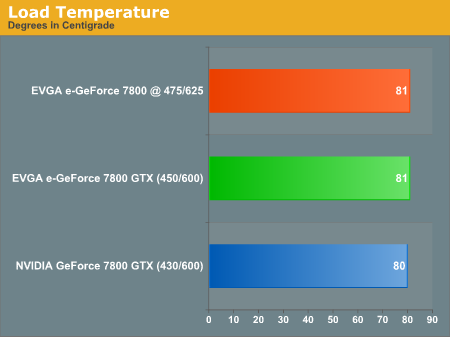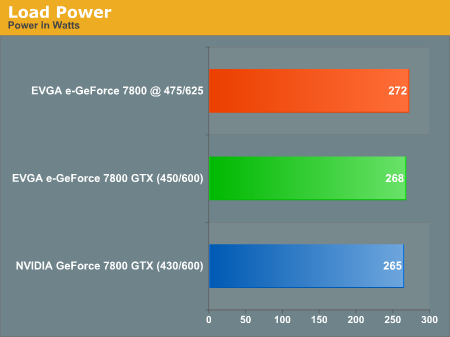Vendor Cards: EVGA e-GeForce 7800 GTX
by Derek Wilson & Josh Venning on July 16, 2005 12:05 AM EST- Posted in
- GPUs
Heat, Power and Noise
Heat

Power
To test the power usage of the card, we measured the total watt usage of the computer at the wall outlet. We documented the power usage of our CPU in 4 different states. The first state was when the computer was idle, and with only Windows running (i.e. no other programs running). Then we plugged in our reference card and ran a performance test for the second. The two last states included the EVGA e-GeForce 7800 GTX and running the test in both normal and overclocked modes, consecutively. This way, we were able to get a general idea of how the power usage varies with the cards, and how significant an impact that it might have.

Noise
We didn't notice any issues with the sound level of the card. It wasn't quiet, but it wasn't as loud as some of the dust-buster solutions that we've seen in the past. The CPU fan was the dominant noise in the room, so we calculated the noise level of the card using a formula that we've employed in the past along with measurements of ambient SPL (everything off), ambient+CPU (computer on with no video) SPL, and total system SPL (everything on). We had to do this because we were unable to turn on the graphics card's fan without turning on the system.The end result gave us an SPL of 38.4 dB, which we will compare to other cards in future articles. This number will be on par with other 7800 cards that have reference-style heat sinks; but if nothing else, we will be able to get an idea of how much noise varies for this type of heat sink.
Those fairly conscious of their computer's power usage may be reluctant to overclock the card because of the jump in power load. And if your computer case has a circulation problem or you live somewhere really hot, it may not be advisable to overclock it. But for most people, the extra heat and wattage shouldn't have that great of an impact given the performance boost.










26 Comments
View All Comments
Hi - Saturday, July 16, 2005 - link
#5 this isnt a place to promote your ebay shitSome1ne - Saturday, July 16, 2005 - link
I have one of these for sale, it overclocks even better than the one in the article (I modded the HSF a bit):http://cgi.ebay.com/ws/eBayISAPI.dll?ViewItem&...
Novaoblivion - Saturday, July 16, 2005 - link
This is a very nice card I have one and even running at stock it kicks ass :)Regs - Saturday, July 16, 2005 - link
PCI-E, kiss it.kmmatney - Saturday, July 16, 2005 - link
If I was spending $600 on a card, I don't think I'd bother overclocking it too much - there's to much to lose if it overheated...kmmatney - Saturday, July 16, 2005 - link
Pretty weak overclock.